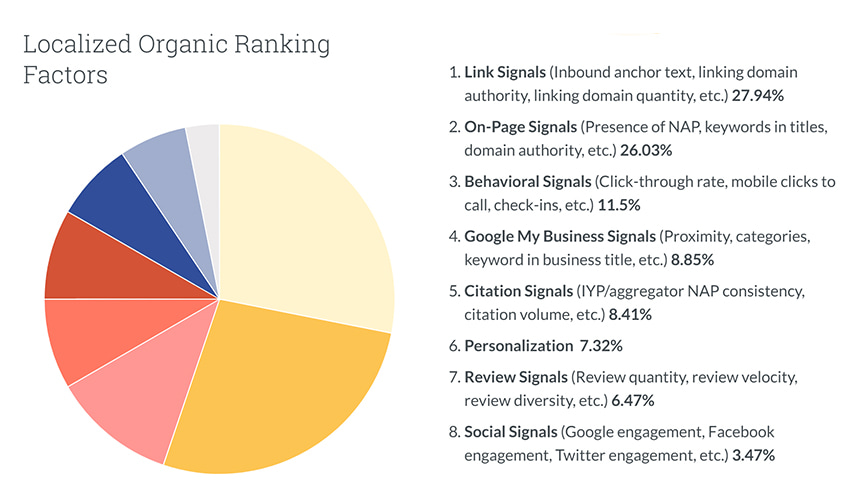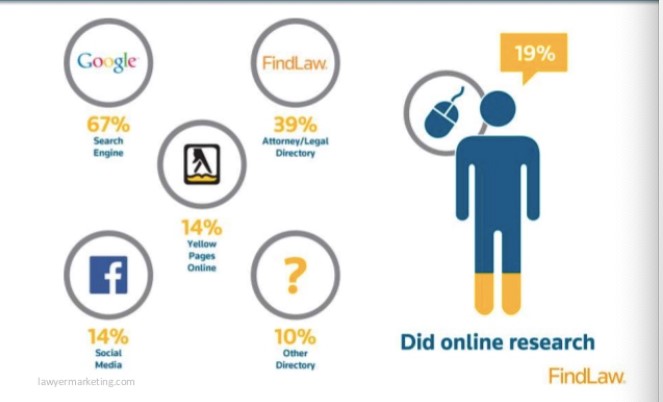These days, people turn to search engines for answers more than anything else. In fact, more than 90% of online experiences begin with a search!
In today’s highly competitive legal market, a strong SEO strategy is critical for making online connections and driving in leads.
According to the Findlaw Consumer Legal Needs report, only 30% of people in need of legal assistance choose to research lawyers through a personal recommendation. 79% rely solely on online searches to find an attorney – and 86% of these searches are made directly through Google.
Lawyer SEO marketing is absolutely critical to capture leads for several key reasons.
First of all, the same study from FindLaw also discovered that 62% of these online searches are non-branded, meaning that people tend to enter more generic searches like “New York divorce lawyer” – rather than a specific office or attorney.
Therefore, your law firm’s SEO strategy must be strategic to incorporate navigational terms that will align with these types of queries. This is to help place your website towards the top of the search engine results pages (SERPs).
It is interesting to note that the traditional path most lawyers follow for SEO may not be the best.
Many law firm SEO services will tell lawyers to pay gobs of money for top ad spots on the search engine result pages. However, in a study from iLawyer Marketing, only 3% of people that were searching online for a lawyer said they were most likely to click on the first result, and one-fourth of the participants actively avoided clicking on paid ad results.
60% of these respondents said they were most likely to click on the result that matched up with their keyword intent. Therefore, your legal marketing needs to be heavily SEO-focused in order to drive in organic traffic.
In order to improve your law firm marketing and SEO, there are several strategies that should be utilized.
Let’s go over some of the big ones.
1. Learn Attorney Schema
Every single website has a specific set of Schema, which is a collection of tags or microdata that sends information to search engines so their algorithms can “understand” the purpose and content of your site.
So, when it comes to law firm SEO marketing, your website’s Schema needs to be properly formatted to send signals to the search engines regarding the purpose of your site. Schema needs to be added in your HTML markup to create rich snippets that are displayed beneath your website title on the SERPs.
You can see here that the first result does not have a set Schema, so Google has collected data (in this case the names of the attorneys in the firm) to create a snippet.
However, the two results below do have a Schema markup that provides a preview so the searcher has an idea of what information the website can provide.

You can even format your Schema to include star ratings from review sites. To format your law firm’s Schema, you can use Google’s Structured Data Markup Helper to generate a code snippet to be added to your website.
Be sure to also include structured data in your website’s Schema, like:
- Phone numbers and extensions
- Addresses
- Email addresses
- Attorney names and biographies
2. Drill Down Subtopics on Your Legal Focus
Another way to improve the SEO for law firms is by narrowing down your subtopic (and keyword strategy) to match with more niche searches.
As mentioned before, the majority of people will enter a non-branded search when they are looking for legal assistance online. However, they will include descriptive keywords to find the exact kind of assistance they need.
For instance, say that a person who lives in Atlanta was injured in a car accident and wants to sue the party at fault to cover the damage to their vehicle as well as their medical bills. Most likely their Google search will look something like this: “Atlanta lawyer car accident personal injury and damages.”
In order to (ideally) appear on the search results page, your website needs to contain related keywords on at least one of your pages. As you can see, this top result contained all of the keywords on their homepage description.

First, you will need to define the niche legal markets that your law firm services. What are your core areas of expertise and what kinds of lawsuits do your attorneys take on?
Once you have your list of specialties, you will want to conduct some keyword research in order to see which long-tail and related search terms are being used by your target clients. There are plenty of online tools for this, but for this example, we will be using Google Trends.
Say that your law office specializes in civil family law, with a focus on areas like adoption, child custody, and guardianship cases. On Google Trends, you can see the trend pattern of searches containing the keyword “child custody lawyer.”

Then, at the bottom of the page, you can see the top related queries related to that search.

As you can see, these searches are slightly more specific and contain additional qualifiers, such as phrases like “near me” or “best.”
By researching and using related keywords, you can strategically improve your law firm SEO by incorporating additional terms often searched by your intended clients throughout your website’s content.
This was one of the key ingredients to our success in helping this Chicago personal injury law firm increase web traffic (and leads).
By diving deeper in their niche, we pinpointed several keyword/phrase verticals within the personal injury space to make sure the firm’s website covered all its bases. This, in addition to several other SEO strategies, was able to boost the firm’s organic traffic by 587% in two years!
3. Create Content for Legal Blogs to Build External Link Network
According to Moz’s latest research, link signals make up 27% of the ranking signals that Google uses to determine search results.

So, one of the best legal SEO “hacks” is to get related blogs to place links on their site that lead back to yours. This practice is called link building.
Commonly, you build inbound links on external websites by submitting guest content that is highly relevant to their audience. In exchange, they include a link back to your website.
For example, Christy Zlatkus, Esquire, is an attorney for Z Family Law – which specializes in divorces and custody cases. She co-authored an article on a blog site that offers advice to people going through a divorce – and the link in her author bio leads directly to her law office’s website.

This helps to increase that legal firm’s external links and drive in relevant traffic from readers who found the article useful and insightful.
Link building can help your law firm SEO immensely.
Most importantly, it can improve your site’s credibility if your link is included on other quality websites.
In order to determine how much credibility a website will pass to yours via linking, Google will evaluate several factors, such as the ranking strength of a linking website, traffic numbers, topic relevancy, and much more. This is called link equity, also referred to as “link juice.”
When a credible website related to what you do links to your website, it acts as an endorsement. The more credible Google sees that related website, the more link equity it passes, and therefore, the bigger the endorsement.
To find the best blogs to submit content to, you can use tools like Moz Link Explorer and Ahrefs to determine the credibility of these sites.
In addition to passing link equity, creating quality content on other legal blogs is a great way to drive interested traffic to your website.
If you are creating content that answers key questions people are searching for on external sites, you are opening the door for people to check out your website and (hopefully) pursue assistance from you. This can help to drive in greater referral traffic numbers, therefore giving your law firm’s SEO a boost.
4. Claim Important Profiles for Local Search Visibility
Moz’s research discovered that roughly 9% of Google’s organic ranking signals are determined from your law firm’s Google My Business page.
But when it comes to local searches, GMB makes up over 25% of ranking factors the search engine uses to optimize their results pages.

This is because a GMB account is designed to provide Google with accurate information on local factors, such as the address, hours of operation, and contact numbers for a business.
So, if a person is searching for a personal injury lawyer in Little Rock, Arkansas, Google will use GMB to find the offices that are located in that area.

You should also make sure that your Law Firm has profiles on multiple review sites to improve visibility.
iLawyer’s Marketing survey found that about 44% of people will use third-party review sites to find an attorney. Google Reviews is by far the most popular, but Facebook, Yelp, and Avvo Reviews are other top review platforms to include in your strategy.

5. Be Active on Social Media
Although social media is not a direct SEO ranking factor, it can be quite useful for boosting traffic numbers, getting your law firm in front of more eyes, and driving in leads.
A survey from FindLaw and Thomson Reuters found that social networking sites like Twitter and Facebook are contributing to decision-making factors when it comes to finding an attorney.

According to their report, customers view social networking sites as a useful tool for gathering information about an attorney, such as reviews and informational content.
Social media is also a channel that people are using to contact businesses directly with various questions or concerns. If a customer is not quite ready to call in or speak to an attorney’s face to face, they may post a question on their Facebook page or Tweet directly to that law firm.
It is important that your legal marketing team is active on your social networking sites to respond to any comments or mentions. You should also be using your profiles to share related content, such as links to blog posts on your website, on relevant external sites, or related news – like this immigration lawyer does on his Facebook page.

It is important to note too that social media networks are becoming “search engines” of their own. About 40% of all consumers use social media sites to discover new brands and companies – and 14% of people seeking legal services have used Facebook to find one.

So again, although social media does not directly impact SEO for law firms, it can support your other strategies and drive in traffic from potential clients that are actively looking for your services.
Conclusion
Law firm SEO marketing doesn’t need to be complicated (or expensive) to be effective; it merely needs to be strategic. By using these strategies, you can optimize your law office’s website so it sends stronger link signals and matches up to more searches that will connect you with relevant clients.
If you want more assistance or information regarding marketing and SEO for law firms, reach out to one of our own local SEO experts to get started.





When he is not working, he enjoys staying fit, spending time with his pets, and living a healthy lifestyle. He believes that life is a matter of choice and that we should always strive to do the right thing.